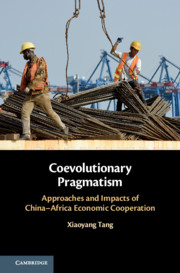Book contents
- Coevolutionary Pragmatism
- Coevolutionary Pragmatism
- Copyright page
- Dedication
- Contents
- Figures
- Tables
- Preface
- Foreword
- Abbreviations
- 1 A “Model” with No Model
- 2 Trade
- 3 Infrastructure
- 4 Agriculture
- 5 Manufacturing
- 6 Special Economic Zones
- 7 Employment and Training
- 8 Social and Environmental Responsibility
- Conclusion
- Index
8 - Social and Environmental Responsibility
Published online by Cambridge University Press: 24 December 2020
- Coevolutionary Pragmatism
- Coevolutionary Pragmatism
- Copyright page
- Dedication
- Contents
- Figures
- Tables
- Preface
- Foreword
- Abbreviations
- 1 A “Model” with No Model
- 2 Trade
- 3 Infrastructure
- 4 Agriculture
- 5 Manufacturing
- 6 Special Economic Zones
- 7 Employment and Training
- 8 Social and Environmental Responsibility
- Conclusion
- Index
Summary
This chapter reviews socioenvironmental issues related to Chinese engagements in Africa. By investigating the behaviors of Chinese enterprises in construction, manufacturing, agriculture, and extractive sectors, the author depicts diverse challenges in various sectors. Large state-owned enterprises and small private businesses demonstrate departing performances and understandings regarding socioenvironmental responsibility. The Chinese government constantly urges Chinese firms to improve socioenvironmental practices because of reputational concerns, but China lacks the legal framework and monitoring mechanism to effectively influence its enterprises’ operation overseas. Weak regulation in Africa often leaves problematic behaviors there unpunished. In this context, Chinese business associations and banks provide pragmatic assistance to promote corporate social responsibility among Chinese investors. In spite of a recent move toward convergence with international norms, China diverges from the West on evaluating the socioenvironmental impacts of industrial projects in the developing countries. As industrialization inevitably alters the original societal structure and natural environment, China does not insist on intact socioenvironmental preservation in developing countries. Large infrastructure projects such as dams are rather viewed as necessary for developing countries to mitigate the impact of global climate change. Emphasis is laid on balancing economic growth and socioeconomic transformation under concrete circumstances so that the development can sustain.
Keywords
- Type
- Chapter
- Information
- Coevolutionary PragmatismApproaches and Impacts of China-Africa Economic Cooperation, pp. 232 - 258Publisher: Cambridge University PressPrint publication year: 2021



